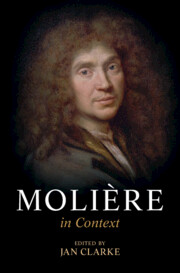Book contents
- Molière in Context
- Molière in Context
- Copyright page
- Dedication
- Contents
- Figures
- Charts and Tables
- Contributors
- Acknowledgements
- Translations
- Abbreviations
- Biographical Preface
- Part I Socio-Political Context
- Part II Intellectual and Artistic Context
- Part III Theatrical Context (Paris)
- Chapter 13 Molière’s Theatres in Paris
- Chapter 14 Stage Design in Paris
- Chapter 15 Company Administration
- Chapter 16 The Theatre Industry and Cultures of Consumption
- Chapter 17 Acting Style
- Part IV Theatrical Context (Court)
- Part V Reception and Dissemination
- Part VI Afterlives
- Further Reading
- Index
Chapter 17 - Acting Style
from Part III - Theatrical Context (Paris)
Published online by Cambridge University Press: 10 November 2022
- Molière in Context
- Molière in Context
- Copyright page
- Dedication
- Contents
- Figures
- Charts and Tables
- Contributors
- Acknowledgements
- Translations
- Abbreviations
- Biographical Preface
- Part I Socio-Political Context
- Part II Intellectual and Artistic Context
- Part III Theatrical Context (Paris)
- Chapter 13 Molière’s Theatres in Paris
- Chapter 14 Stage Design in Paris
- Chapter 15 Company Administration
- Chapter 16 The Theatre Industry and Cultures of Consumption
- Chapter 17 Acting Style
- Part IV Theatrical Context (Court)
- Part V Reception and Dissemination
- Part VI Afterlives
- Further Reading
- Index
Summary
This chapter looks at the evolution of acting styles in Molière’s time, paying particular attention to the creation of a ‘regular acting’ that matched the emergence of the classical rules, and also to the competition between the two main playhouses of the time. Molière prioritised variety. Stage business became a crucible of several traditions and a means of experimenting with new comic effects: from vulgar gestures, beatings and mimicry to lazzi and rodomontades; from provincial accents to stuttering and an uncontrolled emotional hiccup; from cross-dressing to disguise. In the 1660s, Molière sought to differentiate his company from the Hôtel de Bourgogne, whose forte was tragic, oratorical acting, and whose actors may not all have been as physically agile on stage as Molière was himself. He sparked controversy, promoting his hybrid acting ‘brand’, which probably consisted of a combination of an attenuated declamatory style and a faster flow in the tragic and, conversely, an exaggerated and excessive body language style accompanied by extreme contortions in the comic. Molière triumphed on the comic stage, becoming a model and marking the next generations of actors.
- Type
- Chapter
- Information
- Molière in Context , pp. 162 - 172Publisher: Cambridge University PressPrint publication year: 2022

